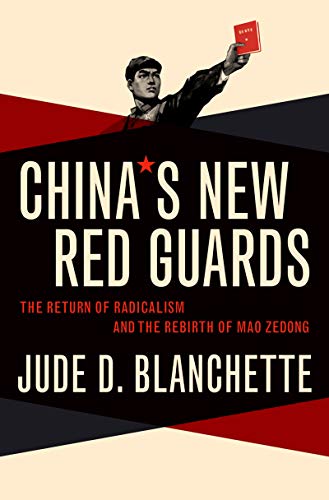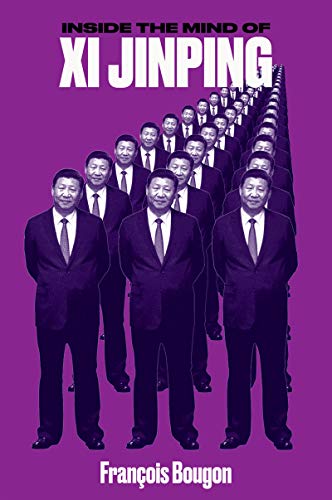Ideological struggle in China is not dead, only hidden. That is perhaps the shortest possible summary of Jude Blanchette’s lively intellectual history of China’s neo-Maoist movement, China’s New Red Guards. He aims to demolish the simplistic idea that China’s populace has agreed not to ask political questions in exchange for economic prosperity, and show how fierce debate over ideas has been a consistent feature of Chinese political life even after the death of the Mao and the end of the Cultural Revolution.
His book contains a lot of fascinating and little-known history, starting with the left-wing criticisms of the renewed economic reforms launched by Deng Xiaoping and Jiang Zemin in 1992. Those critics were quickly muzzled, but they sowed the seeds for what would become, in the late 1990s and mid-2000s, a lively intellectual movement that challenged China’s government for not being socialist enough. Blanchette vividly captures the ferment of the period. A particular highlight is his account of the public furor that a few clever intellectuals stoked with allegations of corruption in privatization of state firms, which led the government to ban management buyouts of SOEs. The substantive and symbolic victories for leftists accumulated even faster after Xi Jinping came to power in 2012, and at times the neo-Maoists can barely contain their glee. One of the most striking passages comes toward the end:
“We won,” the nationalist writer Wang Xiaodong told me. “Maybe I didn’t win personally, but our ideas won.” Looking at the policies Xi adopted in his first five years in power, Wang saw much to commend. China had moved away from relying on the market to allocate resources, it had reversed what he saw as a decade-long trend of restricting the growth of China’s state sector, and the party was now embracing the idea of “national champion” firms serving China Inc. “The state of SOEs today is strong, roughly what I called for in the 1990s,” Wang said. “My position has basically been realized.”
It is tempting to read Blanchette’s book as a narrative arc in which the leftists move from despair in the 1990s to triumph in the 2010s. The structure of the book encourages this reading, as does the fact that it is often written from the perspective of the neo-Maoists themselves.
That would not be correct. It is hard to say the neo-Maoists have triumphed when they are still regularly censored and when Xi is still pursuing “rightist” policies like opening up China’s stock markets to more foreign investment (Wang Xiaodong’s victory lap is also from the perspective of a strong-state nationalist; he is not really a neo-Maoist). Blanchette makes this quite clear from the start, pointing out that the government is happy to use neo-Maoists as internet attack dogs when they serve its purposes, and happy to shut them up when they are not.
In short, Xi Jinping is in control of the neo-Maoists, not the other way around. Indeed, the neo-Maoists are well past their prime: they thrived in the more unfettered online environment of a decade ago, and like other schools of thought they now have very little space for open discussion. There is no longer any serious battle of ideas in public. So the story of ideological struggle in China over the past decade is not exactly one of the triumph of a fringe leftist intellectual movement. Rather, it is really the story of the triumph of Xi Jinping, who has imposed an increasingly stifling uniformity on the intellectual sphere. Like it or not, understanding the intellectual world of China today requires grasping Xi’s ideology.
While Xi is proficient at delivering “dog whistles” that excite the neo-Maoists, he is not one of them. Rather, his ideology draws on multiple sources, as the excellent book Inside the Mind of Xi Jinping, by the French journalist François Bougon, makes clear. Bougon seems to have constructed his short and vividly written book through the simple strategy of reading a lot of Xi Jinping’s speeches and articles, and taking them seriously. By tracking down Xi’s various inspirations, he provides a more comprehensive overview of the important strands in China’s intellectual scene over the last couple of decades.
In addition to the neo-Maoists, these include the so-called “New Left” and “Neo-Authoritarian” thinkers, who tend to endorse nationalism and a strong state but without following the neo-Maoists into nostalgia for the Cultural Revolution. The most important of these is undoubtedly Wang Huning, a law professor from Shanghai who advised many previous leaders and has now been elevated to the ruling Politburo Standing Committee. Wang is credited with helping former leader Jiang Zemin draft his “Three Represents” policy that led to the admission of private entrepreneurs to the Communist Party–a decision seen as a disastrous mistake by the neo-Maoists. If someone were to write a book profiling the neo-authoritarians, Wang’s rise to top echelons of power would surely also deserve a “we won” moment.
Xi also regularly cites classical Chinese sources, including those from the schools of Daoism, Legalism and Confucianism. In doing this he of course he goes very much against the example of Mao, who wanted to expunge Confucius and other feudal remnants from modern China. The revival of traditional culture is another important recent intellectual movement in China, and one with wide influence and popular appeal. Bougon observes that “the alliance of Confucianism and Marxism…defies logic to an outside observer.” But to an insider, the political logic is quite clear: Confucianism and Marxism are in different ways both sources of national pride for China, and a nationalist government should harness them both.
Bougon perceptively argues that Xi’s ideology is ultimately an attempt to combine three distinct traditions: the socialist tradition originating with Mao; the heritage of Chinese traditional culture; and the prosperity-focused reformist tradition of Deng Xiaoping. All three traditions have appeal in today’s China, and attempting to combine them is not an original strategy. Xi’s predecessor Hu Jintao also tried to merge invocations of traditional culture with appeals to both socialism and economic modernization. Xi’s political skill is demonstrated by how he can better command support from adherents of all three traditions, and by how he has more convincingly combined these threads into a ruling ideology.
One of the best examples of the daring and verve of Xi’s intellectual fusion is one of his very first speeches, given on January 5, 2013 but not published until some time afterward (you can read Tanner Greer’s translation of the whole thing, or my translation of the key passages). This speech has become famous for its insistence on the equal status of China’s “two historical periods”: the 1949-78 period of socialism, and the post-1978 period of reform. Xi argued that “these two periods are not separate from each other, and are not at all fundamentally opposed” and that neither period can be used to “deny” or “repudiate” the other. Many people initially took this as a sign that Xi wanted to reverse economic reforms and bring back Maoism. In fact, as Bougon explains, it was political triangulation, Chinese-style:
He calls for a synthesis of the two first eras of the regime, the Mao era and the post-Mao era—between the Revolution, and ‘Socialism with Chinese characteristics’. He wants to perpetuate a form of capitalism that is under the aegis of the Party, as imagined by Deng Xiaoping—even if this involves glossing over the Party’s blunders under the rule of Comrade Mao.
In political terms, this meant that Xi struck a blow to both the left and the right. … It is also absolutely forbidden, therefore, to use one past to spite the other; to invoke Mao against opening up, or to criticise Mao in the name of opening up.
In this speech, Xi rejected the liberals’ call for jettisoning Mao–but he also rejected the neo-Maoists’ call for a reversal of economic reforms. In my view, this political synthesis is in the end not so different from the one imposed by Deng Xiaoping and Jiang Zemin in the 1990s. Jiang made it clear that conservatives nostalgic for the 1950s would not be allowed to stop economic development, and that liberals sympathetic to the 1989 protesters would not be allowed to erode Party rule. Despite a lot of twists and turns since then, China’s ruling ideas in some ways have not changed very much.



Professor Prem raj Pushpakaran writes — 2020 marks the birth centenary year of Douglass Cecipl North, who pioneered the cliometrics !!!